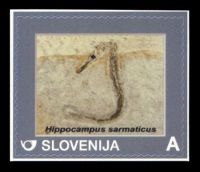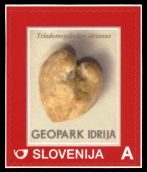Slovenia
2015
"Stories written in stone - Geology of Kamnik-Savinja Alps and Karavanke"
| Issue Date |
23.05.2015 |
| ID |
Michel:
(frame)
Stanley
Gibbons: UPU:
Category: pR |
| Author |
Photograph: Mr. Thomas Hitij.
Special Cancel - made by DATA PRINT d.o.o. Kamnik |
| Stamps in set |
2 |
| Value |
B - decapod of the genus Aege
C - fish of the genus Placopleurus
* A - standard letter inside country - 0,29 EUR
|
| Size (width x height) |
|
| Layout |
sheets of 25 stamps
|
| Products |
FDC x 1 |
| Paper |
self adhesive
|
| Perforation |
|
| Print Technique |
|
| Printed by |
OSNOVNA SOLA FRANA ALBREHTA
|
| Quantity |
stamps: 200 each, FDC: 100 |
| Issuing Authority |
Philatelic Club Ivan Vavpotic Kamnik, Slovenia |
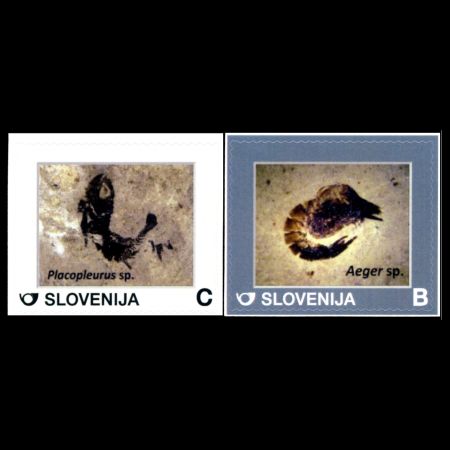
On
May 23 2015, Philatelic Club Ivan Vavpotic Kamnik, Slovenia issued set
of two commemorative self-adhesive stamps.
About
240
million years ago during the Triassic period a warm equatorial ocean
Tethys was covering the area of today's Kamnik-Savinja Alps, Slovenia.
Diverse plant and animal communities lived in this ocean and on the
nearby islands. After the death, their remains were deposited and
preserved within the sediments, which today form rocks that build the
mountains.
After the winter of 2006, several samples of
Triassic
dark bituminous marlstone and laminated limestone were collected by
Tomaž Hitij in the loose in the scree in the Kamniška Bistrica valley
in the Kamnik-Savinja Alps,
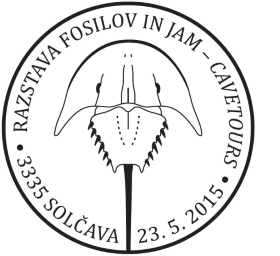 |
northern part of the Central Slovenia. The
site was more precisely investigated and during the field expedition in
September 2006 when the first fish remain was found on a fragment of
dark bituminous marlstone. Afterwards, several surveys were carried out
in search for the original outcrop, which was discovered at the end of
September 2006 by Tomaž Hitij and Jure Žalohar. In the following years
the broader area of the Kamnik-Savinja Alps was investigated in more
detail. As a result of this work, several new sites with mostly very
well preserved Triassic plant, mollusk, decapod, brachiopod, echinoid,
ophiuroid, crinoid, fish, and reptile remains were found. Among the
most important was the discovery of the conservation Lagerstätten
fossil sites in the beds of the Strelovec Formation and Velika Planina
Horizon. Because of the exceptionally well-preserved decapod, fish and
marine reptile fauna, the Middle Triassic of this area can be placed
among the most important Middle Triassic fossil sites in the
World. The personalized stamps depicting juvenile decapod of
the
genus Aeger, fish of the genus Placopleurus and postal mark depicting
first Slovenian Xiphosura fossil, were issued to commemorate the
opening of the permanent fossil exhibition ''Stories written in stone -
Geology of Kamnik-Savinja Alps and Karavanke'' in the Solčavsko region,
Slovenia.
Similar stamps:
Products
| FDC |
Used FDC and letters |
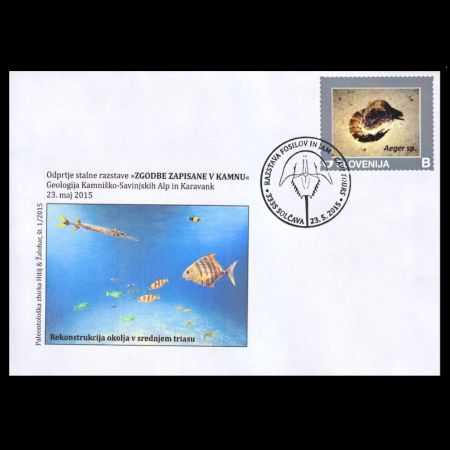
|
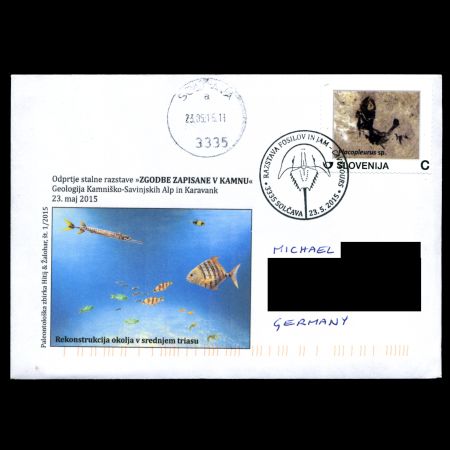
|
|
|
|
Last update 20.01.2018
Any feedback, comments or even complaints
are welcome: admin@paleophilatelie.eu (you
can email me on ENglish, DEutsch, or RUssian)



